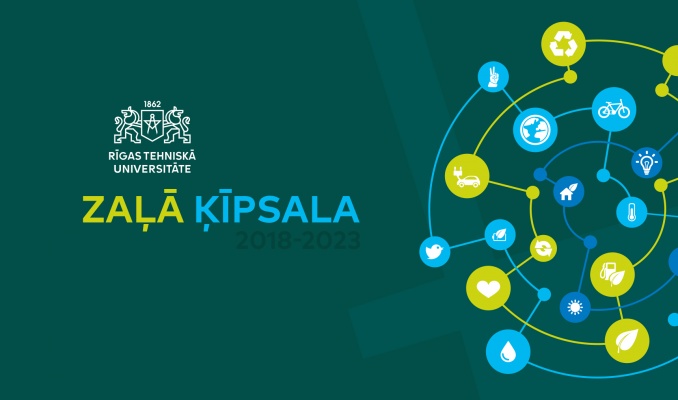
To become the most advanced engineering study centre in the Baltic region, the development of the campus of Riga Technical University (RTU) in Ķīpsala is based on sustainable, smart and environmentally-friendly initiatives. Developing RTU Green Concept 2018–2023, the goal of the University is to raise awareness of students, employees and the general public about the need to reduce the ecological footprint and to encourage the creation and use of environmentally-friendly technologies. These principles have already been taken into account in the creation of RTU study and research infrastructure – by constructing and reconstructing buildings, furnishing and equipping them – and in the promotion of behaviour change based on the green concept. Carbon intensive technologies in various sectors of the economy and innovative solutions for more efficient and smart use of resources are also a significant research field of RTU scientists.
Solar panels and wind turbine are installed on the roof of RTU Faculty of Power and Electrical Engineering. The devices both “serve” the building and are used in the study process and research. One more wind turbine is planned to be installed on the roof of the faculty in the near future.
A lot of electricity is consumed for lighting, which is why the transition to LED lighting elements and fluorescent light bulbs is intensive. In the newly constructed buildings of the University, such lighting elements are everywhere, but at RTU hostels – in public areas. It is planned that around 75 % of all lighting objects will be replaced by 2020.
Energy-efficient outdoor LED lighting is also installed in Ķīpsala campus.
The public premises of newly constructed and renovated buildings of the campus are equipped with motion sensors, providing lighting only when someone is inside the premises.
RTU Faculty of Power and Electrical Engineering is fully automated – ventilation, air conditioning, heating and lighting systems are controlled through a single control panel. The windows are covered by automatically controlled blinds that provide optimal lighting in the premises – they open and close depending on the brightness of the light.
Automatically controlled blinds that provide optimal lighting in the premises are also installed at RTU Faculty of Electronics and Telecommunications.
Automatically controlled blinds that provide optimal lighting in the premises and the ventilation system are also installed in the new extension of RTU Scientific Library.
RTU Faculty of Architecture is located in a smart building. The lights turn off automatically in the building. Natural light is used in the atrium. In the premises, CO2 sensors are installed, an automated ventilation system is introduced, the operating intensity of which is determined by the CO2 concentration in the premises. The windows are covered by automatically controlled blinds that provide optimal lighting in the premises – they open and close depending on the brightness of the light.
Informative and educational activities are implemented, promoting the responsible use of energy resources.
In the process of the reconstruction of faculty and hostel buildings, insulation works are done, i.e., insulation of exterior walls, roofs, lofts and basements in order to reduce heat loss in the cold months of the year and the energy consumption of cooling systems in the summer.
An automated air supply system has been introduced which, taking into account the ambient temperature data and indoor indicators, supplies fresh air by heating it efficiently and reducing heat loss. In the summer, this system ensures cooling of the premises.
In the hostels and RTU Ķīpsala swimming pool, heat energy obtained from warm wastewater is used to heat water. After the heat recovery, the wastewater is discharged into the sewerage system.
Informative and educational activities are implemented, promoting the responsible use of energy resources.
To reduce the amount of water consumed in the amenities, motion sensors are installed, which provide water only when necessary, when the utilities are used.
Informative and educational activities on the importance of water conservation are implemented.
RTU Faculties use drinking water dispensers in order to reduce the use of plastic bottles and the total amount of waste. Thus, the environmental impact is lowered by reducing the resources needed to prepare bottled water.
In the everyday activities of the University, the most commonly used material is paper. According to the waste structure, paper waste sorting boxes are located indoors.
The waste sorting tanks are installed at the Institute of Environmental Protection and Heating Systems of RTU Faculty of Power and Electrical Engineering and the Student Parliament. Until the next academic year, such sorting tanks are planned to be installed in all buildings of the campus.
Outdoor containers for sorted waste are also located in the campus. There are containers for paper, glass and household waste.
To reduce the use of paper, electronic circulation of documents is promoted and digitisation of studies takes place.
The used bulbs are collected for recycling.
Informative and educational activities on the importance of waste segregation are implemented.
To promote cycling, which is an environmentally-friendly type of mobility, bike racks are installed at all faculties. The guarded bicycle parking places are provided in a car park opposite RTU Faculty of Architecture.
Electric car charging stations are installed at all faculties of RTU and the administration building.
RTU employees use electric cars on a daily basis. With the support of the Climate Change Financial Instrument, 14 electric cars powered by electric power have been purchased, thus reducing CO2 emissions.
Concentrating academic and research activities in Ķīpsala campus reduces the need to use means of transport by students and academic staff members.
The deans of regional study and science centres in Cēsis, Daugavpils, Liepāja and Ventspils have the opportunity to take part in the Deans’ Council meetings remotely. Remote communication is also used in cooperation with foreign colleagues in the implementation of international projects.
Car parking is arranged in RTU complexes using zoning detection, i.e., the smooth flow of traffic is ensured and congestion is prevented.